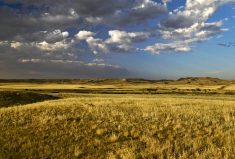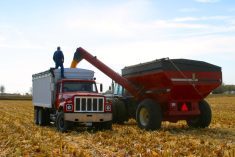A federal On-Farm Climate Action Fund is a step towards a government that is willing to listen to and partner with farmers, says the Canadian Federation of Agriculture (CFA).
“It’s a great start. It truly is. It’s something that we’ve been asking for, for a long time,” said Keith Currie, first vice-president of the CFA. “We have a long way to go.”
On August 12, federal Ag Minister Marie-Claude Bibeau launched a call for proposals under the $200-million fund, which the government promised in its 2021 budget this spring.
Read Also

Farm Credit Canada forecasts higher farm costs for 2026
Canadian farmers should brace for higher costs in 2026, Farm Credit Canada warns, although there’s some bright financial news for cattle
Through organizations like commodity groups, Indigenous groups, provincial Crown corporations and others, the funds are slated to go towards supporting farmers to adopt cover cropping, nitrogen management and rotational grazing practices the federal government said in a news release.
These practices will reduce greenhouse gas emissions and make farms more resilient to severe weather like this year’s drought, the government added.
Ponying up cash to help make these changes along with actually listening to producers’ ideas is crucial in reaping the environmental benefits without putting an unfair burden on farmers, said Currie.
“(World leaders are) saying, ‘the world’s going to end and we’ve got to fix this.’ And you and I, and my farming and ranching friends, we’re worried about the end of the week or the end of the month,” Currie said.
Governments have often resorted to saying, “thou shalt,” said Currie — for example, with the carbon tax — without recognizing the disproportionate impact on farmers.
“Our leaders don’t think about the practicality of implementing something on the ground,” he added. “They don’t have experience with agriculture in particular and they don’t understand how – what we would really want to be with them is a partner in how we move this forward.”
Farm organizations, including the National Farmers Union (NFU) and Farmers for Climate Solutions have asked for a similar partnership for a long time.
“The NFU has urged governments to partner with farmers to enhance grazing management, adopt cover crops, and, especially, to use nitrogen more efficiently and at lower rates. The August 12 announcement is a key step toward many of the programs and outcomes the NFU has led in advocating,” the NFU said in a statement sent to the Co-operator.
The NFU and Agriculture-Agri-Food Canada tout the mentioned best management practices as ways to mitigate drought damage. With morale low after a brutal summer, government and partner organizations will need to be careful how they present their pitch, said Currie.
“‘Thou shalt’ does not sit very well,” he said.
Farmers need to hear that they’re going to be helped through drought devastation, and then organizations can ask, “How can we be a partner with you going forward?” Currie said.
However, wild weather is also a wake-up call, said Anastasia Fyk, an NFU board member for Manitoba.
“Business as usual isn’t going to work for farmers in coming years,” she said. “But farmers are also realistic, and they start each new year with optimism.
“While recent years have dealt setbacks, many farmers are looking around for steps they can take to better position themselves for the new climate realities,” Fyk added.
The federal program is trying to make farmers more resilient in the face of droughts by improving margins, soil structure and water-holding capacity, said Fyk. It’s also trying to contribute to global efforts to stabilize temperatures.
















